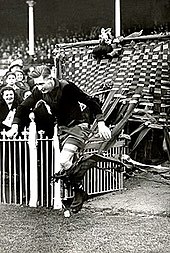Norm Smith
A Legend in the Australian Football Hall of Fame, Smith is regarded as one of the greatest and most influential coaches in the game's history, as well as being one of the finest full-forwards of his era.
Like legendary Collingwood coach Jock McHale, Smith could take young players of different backgrounds and mould them into a disciplined team.
[1] Along with his brother Len, Smith's ability to think innovatively when it came to tactics had a profound influence on the game, most notably through his protégé Ron Barassi.
After attending Westgarth Central School, Smith completed an engineering apprenticeship and worked at Millers rope-works in Brunswick.
[3] A brilliant all-round sportsman in his youth, Smith played first-grade district cricket and Australian football.
Melbourne were ambitiously rebuilding their side and Smith made his debut under legendary coach Frank 'Checker' Hughes in 1935.
Usually playing as full-forward, Smith quickly developed an understanding with teammate Ron Baggott and earned a reputation as a cool-headed, "thinking" player.
Under Hughes, a successful former Richmond player and coach, Melbourne had remade themselves into a more professional outfit, after many years as an amateur club.
The following year, the team marked themselves as a special combination by completing the hattrick, despite missing players due to war service and injury on Grand Final day.
Deciding that it was a perfect note on which to end his marathon career, 'Checker' Hughes retired as coach, and Smith was a keen applicant for the position.
Disappointingly for Smith, the committee decided (by a single vote) to award the job to ex-Melbourne premiership skipper, Allan LaFontaine.
Smith built his success on an espirit de corps, creating close-knit teams during Melbourne's years of greatness that were the envy of the other eleven clubs.
Norm and Len Smith (who coached Fitzroy from 1958 to 1962) led the move toward a quicker, play-on style of football.
When Barassi rejected that proposal and insisted on a clearance to the Blues, some Melbourne officials unfairly accused Smith of ridding himself of a potential rival.
[6] Smith made an emotional appearance on television on the Sunday and speculation was rife that he would replace his ill brother, then coaching Richmond.
It was a sad year for the Smith family, as brother Len had succumbed to a heart attack just months before his adopted club Richmond won the premiership.
At Albert Park, Smith pulled off what was considered one of his best coaching performances by taking the downtrodden Swans to the 1970 semi-final, their first finals appearance since 1945.
Although his blunt manner of speaking and intolerance for fools sometimes led him to conflict, he was universally admired and respected for his insightful thinking on the game and his mantra that teamwork was all.

